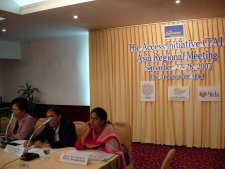Bangladesh enacted the Right to Information (RTI) Act in 2009. However, the TAI Bangladesh coalition identified areas for improvement including the creation of greater transparency, awareness and higher demand for information but also better supply of the required information. This includes improving the capacity of officials tasked with proving information, addressing the lack of record keeping and insufficient resources and infrastructure. Led by the Bangladesh Environmental Lawyers Association (BELA), the TAI Bangladesh coalition was established in 2007. In 2009 BELA managed a regional exchange program for community leaders intended to develop a network of forest dwellers in South Asia and advance their capacity to engage in participatory governance. This included a regional training workshop on access issues relating to the forest. In July 2010, TAI partners worked with the Asian Development Bank, UNEP, and the Government of the Philippines to bring together over 100 Supreme Court judges, lawyers, and government officials to establish a network to facilitate their work in environmental cases. Activist and lawyer Syeda Rizwana Hasan of BELA was one of six recipients of the 2012 Ramon Magsaysay Award. She also received the Goldman Environmental Prize in 2009.
Bangladesh
Region
South Asia
1.10
Environmental Democracy Index Score
Bangladesh received a good score on the Justice pillar, a fair score on the Transparency pillar, and a poor score on the Participation pillar. National law does recognize a broad right to access environmental information on request. However, only a few government authorities are obligated to proactively disclose environmental information to the public. The public is granted the opportunity to participate in only a few decisions related to the environment. The Environmental Conservation Act (ECA) grants the authorities complete discretion to determine whether, and how, rules governing public participation in environmental decision making should be promulgated. As for the Justice pillar, the public can challenge government decisions on environmental matters, but only a few remedies are available to individuals when their environmental rights are violated. By addressing these issues, Bangladesh could ensure that more environmental information is proactively made available to the public, the public can participate in environmental decision making, and the public is granted adequate remedies when rights are violated.
Visit the Environmental Democracy Index to explore the EDI score.
